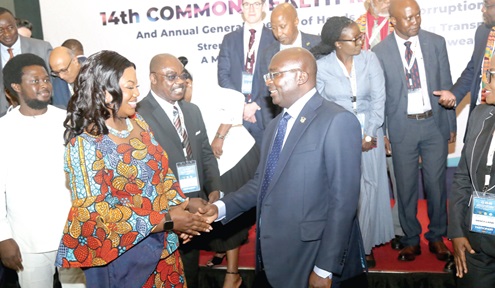
Bawumia encourages use of digitalisation in fight against corruption
The Vice-President, Dr Mahamudu Bawumia, has encouraged anti-corruption agencies in Africa to harness the power of digitalisation in the fight against corruption.
Advertisement
He mentioned bribery, revenue leakage and corrupt networks as the three areas digitalisation could be employed to make a difference. Dr Bawumia also stressed the need for a comprehensive approach that targets not only individuals, but networks and value chains.
He described the impact of corruption on the continent that lost over $1trillion in the past five decades as devastating. The Vice-President was addressing the 14th Regional Conference of Heads of Anti-corruption Agencies in Commonwealth Africa in Accra yesterday, on the theme: "Strengthening institutions and promoting transparency: a means of fighting corruption in Commonwealth Africa."
More than 120 delegates, including anti-corruption agencies from across 21 Commonwealth Africa countries, shared experiences and strategies in the fight against
corruption.
Investment
Dr Bawumia further urged anti-corruption agencies to invest in digital forensics and tools to track, trace and disrupt corruption networks. Ghana, he said, had made significant progress in digitalisation through the introduction of a biometrically enabled identity card, digitising access to services, and tracking revenue and suspicious activities.
The Vice-President added that the country was now working towards becoming the first blockchain-powered government in Africa, to ensure transparency and immutability in digital data.
Sierra Leone example
The Commissioner of the Anti-corruption Commission (ACC) of Sierra Leone, Francis Ben Kaifala, said the country had introduced a groundbreaking non-prosecution policy to revolutionise the fight against corruption in that country.
He said the policy would address challenges faced by the ACC in the prosecution of corruption cases, including lengthy judicial processes and complex evidences. It also includes the introduction of a non-prosecution policy under Section 7 of the law, which allows for recovery of assets, payment of a 10% fine, and a 10-year ban on holding public office.
Mr Kaifala said the policy had already yielded significant results, with the recovery of substantial amounts of money from corrupt state officials. He said funds recovered had been used to construct health facilities and also provided loans to students.
Mr Kaifala added that the innovative approach had set a precedent for other anti-corruption agencies in the region, which demonstrated that alternative measures could be effective in combating corruption and recovering stolen assets.
Botswana’s story
The Deputy Director-General of the Directorate on Corruption and Economic Crime (DCEC) of Botswana, Priscilla Kedibone Israel, also said that the organisation planned to conduct lifestyle audit to investigate possession of unexplained wealth.
She acknowledged that investigating corruption was complex because those involved went to great lengths to conceal their actions. Ms Israel, however, said that by embracing innovation and collaboration, Botswana was leading the way in the fight against corruption.




